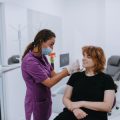1. Understanding Laser Skin Resurfacing
Laser skin resurfacing is a cutting-edge aesthetic procedure that has become increasingly popular in Britain, not just among women but also among men seeking to enhance their appearance and address specific skin concerns. This technology utilises concentrated beams of light energy to carefully remove damaged outer layers of skin, encouraging the growth of new, healthier skin cells. The result is a smoother, more youthful complexion with reduced signs of ageing, scarring, or sun damage. For men in the UK, whose skin typically tends to be thicker and oilier compared to women’s, laser resurfacing offers tailored solutions that address issues like acne scarring, uneven texture, enlarged pores, and the effects of daily shaving. Clinics across Britain now offer bespoke laser treatments designed for male skin types, ensuring that the procedure is both effective and sensitive to the unique needs of men. As societal attitudes towards male grooming continue to shift, more men are turning to laser resurfacing as a practical and scientifically-backed option for maintaining healthy, confident skin.
2. Challenging Stereotypes About Male Grooming in Britain
For decades, the British approach to male grooming has been characterised by understated routines and a certain cultural reticence towards advanced skincare treatments. The prevailing narrative often dictated that men should stick to basic hygiene, with anything more considered unmanly or vain. However, recent years have witnessed a marked shift in these perceptions, as more British men openly embrace modern skincare solutions such as laser skin resurfacing.
Examining Societal Perceptions
The stereotype that skincare is solely a womans concern has long shaped attitudes in Britain. Historically, advertising and media reinforced these gendered norms, depicting skincare clinics and products as female territories. Yet, a new generation of British men are challenging these outdated ideas. This evolution is not just about vanity—its about health, self-confidence, and taking pride in one’s appearance.
Cultural Shift: Embracing Advanced Skincare
The shift towards acceptance can be attributed to several factors. First, public figures and influencers have begun discussing their own experiences with treatments like laser skin resurfacing. Second, there is growing awareness about skin health issues specific to men, such as shaving-related irritation and environmental damage. As a result, clinics across the UK now report an increase in male clients seeking professional advice and treatments.
British Attitudes: Then vs Now
| Aspect | Traditional View | Modern Perspective |
|---|---|---|
| Male Grooming | Basic hygiene; minimal products | Comprehensive routines; openness to treatments |
| Perception of Advanced Skincare | Seen as unnecessary or feminine | Recognised as beneficial for confidence and health |
| Social Acceptance | Stigma around visible grooming efforts | Growing normalisation in social and professional circles |
| Availability of Treatments | Limited options tailored for men | Increasing number of clinics offering male-focused services |
This ongoing transformation in British attitudes is paving the way for men to explore solutions like laser skin resurfacing without reservation. The increasing visibility of male clients at skincare clinics is a testament to this positive change—men are now empowered to invest in their skin health while confidently breaking old stereotypes.

3. Why Male Skin Is Different
The Biological Blueprint
When it comes to skin, men and women are not created equal—especially from a biological standpoint. Male skin is typically around 20-25% thicker than female skin due to higher levels of collagen and androgens, which means it’s generally more resilient but also prone to deeper lines and coarser texture. Men also have more active sebaceous glands, leading to oilier skin that’s more susceptible to acne and enlarged pores. In the UK’s often damp and chilly climate, these differences can become even more pronounced, with irritation from frequent shaving and exposure to wind and pollution further aggravating skin concerns.
Lifestyle Factors Unique to British Men
Beyond biology, lifestyle choices play a significant role in shaping the skin health of British men. The tradition of daily shaving—a ritual for many—can cause micro-tears, ingrown hairs, and persistent redness. Moreover, the rise in outdoor activities, from weekend football matches to brisk walks in the countryside, exposes skin to the elements. Coupled with a sometimes casual approach to sun protection, these habits can accelerate premature ageing and uneven pigmentation. Add in common urban stressors like pollution in cities such as London or Manchester, and it becomes clear that British men face a unique set of skin challenges.
Common Skin Concerns for Men in Britain
- Razor burn and ingrown hairs from frequent shaving
- Oily skin and enlarged pores
- Sun damage and pigmentation irregularities
- Early onset wrinkles due to thicker skin structure
- Sensitivity caused by environmental factors
The Importance of Bespoke Treatments
Given these biological and lifestyle differences, one-size-fits-all skincare simply doesn’t cut it for men—especially in Britain. Laser skin resurfacing offers a tailored approach that addresses male-specific concerns: targeting deeper lines, controlling excess oil production, and improving skin texture without extensive downtime. Clinics across the UK are now recognising the need for bespoke treatment protocols that account for men’s thicker skin, higher collagen density, and unique patterns of ageing. This personalised strategy not only delivers better results but also helps break down the lingering stereotypes about men’s skincare being an afterthought.
4. Treatment Expectations and Typical Results
For British men considering laser skin resurfacing, understanding what to expect is essential for a positive experience. While the transformative potential of laser treatments is widely discussed, realistic expectations help prevent disappointment and foster long-term satisfaction. Here’s an honest look at typical outcomes and feedback specifically from UK men.
Common Improvements Reported by Men in Britain
| Skin Concern | Typical Result After Laser Resurfacing | Feedback from UK Clients |
|---|---|---|
| Acne Scarring | Noticeable softening of scar texture; scars less visible after a few sessions | “Saw a definite improvement, but old scars didn’t disappear completely” |
| Fine Lines & Wrinkles | Smoother skin surface, reduction in fine lines especially around the eyes | “Subtle change—mates noticed I looked fresher rather than ‘done’” |
| Pigmentation & Sun Damage | Lighter and more even skin tone over several weeks post-treatment | “Freckles faded nicely—felt more confident going without cover-up” |
| Overall Skin Texture | Tighter pores, less roughness, improved feel to touch | “Didn’t expect my skin to feel this different—almost like after a really good shave” |
Setting Realistic Expectations: What Men Should Know
- No Overnight Miracles: Results build gradually as the skin heals and regenerates. Most men notice peak improvements between 2–6 months after the final session.
- Downtime Is Real: Redness, mild swelling, and peeling are common for several days post-procedure. Planning ahead is advised—many gents book treatments before a long weekend or holiday.
- Multiple Sessions May Be Needed: Deep scarring or pronounced sun damage may require a course of treatments for best results.
- Natural Look Favoured in the UK: The goal is healthy-looking skin, not an artificial finish. Feedback often highlights subtlety and authenticity as positives.
- Aftercare Matters: Adhering to recommended aftercare (moisturising, sun protection) significantly influences both results and recovery time.
The British Perspective: Honest Feedback Counts
Men in Britain tend to value practical outcomes and straightforward communication about what laser resurfacing can achieve. Clinics across London, Manchester, and Edinburgh report that most male clients appreciate clear timelines for recovery and realistic discussions about results. The consensus? Laser skin resurfacing offers tangible improvements—especially for those dealing with the after-effects of acne or sun exposure—but it’s not a cure-all. A measured approach ensures high satisfaction and encourages more men to explore advanced skincare without fear of stigma.
5. Addressing Common Questions and Concerns
When it comes to laser skin resurfacing, British men often have a handful of practical questions before deciding to take the plunge. It’s only natural—after all, we’re not the type to jump on a trend without knowing what we’re getting into. Here, let’s tackle some of the most frequent queries using straightforward answers and honest examples from blokes across the UK.
How Much Downtime Should I Expect?
One of the first things chaps want to know is: “Will this knock me out of action for days?” The good news is, modern laser techniques are designed with busy lives in mind. For most treatments, you might notice redness or mild swelling—think a bit like catching too much sun on a weekend in Brighton. Typically, you’ll be presentable within 3-5 days, though deeper treatments could mean taking it easy for up to a week. Many men opt to book sessions around bank holidays or remote workdays to keep things discreet and convenient.
Is It Safe?
Safety is top priority, especially with something as visible as your face. When performed by a qualified practitioner registered with the relevant UK bodies (like the Care Quality Commission), laser resurfacing is considered safe. Clinics should always offer a patch test first—so you won’t get any nasty surprises. It’s wise to check reviews and ask your mates for recommendations if you’re unsure where to start.
Will I Look “Overdone”?
Let’s be honest: no one wants to leave looking like they’ve had “work” done. Most British men prefer subtle improvements—think healthy, refreshed skin rather than anything drastic. Practitioners here understand that, and tailor treatments accordingly. You’ll likely hear stories from other gents who found their colleagues simply thought they’d come back from holiday looking well-rested—not suspiciously smooth.
What About Long-Term Results?
A common concern is whether the effects will last or if you’ll need constant touch-ups. In reality, results can last for several years depending on your skin type and lifestyle (yes, that means sunscreen even on cloudy Manchester days). Maintenance sessions are optional; many men find one treatment gives them just the boost they’re after for quite a while.
Does It Hurt?
No beating around the bush—it’s not entirely pain-free, but most men describe it as a warm tingling or prickling sensation. Local anaesthetic creams are usually applied beforehand, and clinics across Britain are well-versed in keeping discomfort to a minimum.
If you’ve got more questions or just want a chat about what’s involved, reputable clinics are happy to walk you through everything—no pressure or hard sell, just clear British honesty. After all, making informed choices is what we do best.
6. Choosing the Right Clinic and Practitioner
When considering laser skin resurfacing, selecting a reputable clinic and certified practitioner is crucial for British men seeking safe and effective results. The UK offers a wide array of clinics, but not all are created equal—making due diligence essential.
Check Qualifications and Certifications
Always ensure that your chosen practitioner holds proper credentials recognised by UK regulatory bodies such as the General Medical Council (GMC) or the Care Quality Commission (CQC). These accreditations demonstrate a commitment to high standards of practice and patient safety.
Experience Matters
Look for practitioners with demonstrable experience in performing laser skin resurfacing on male clients. Men’s skin has unique characteristics, such as increased thickness and higher collagen density, which require specialist understanding. Do not hesitate to ask for before-and-after photos or patient testimonials specific to male treatments.
Clinic Reputation and Hygiene
Word-of-mouth recommendations from friends or online reviews on platforms like Trustpilot can offer valuable insights into a clinic’s reputation. Visit the facility beforehand to assess cleanliness, professionalism, and the overall atmosphere—these factors reflect a clinic’s approach to safety and care.
Consultation Process
A credible clinic will always provide a thorough consultation prior to any procedure. This should include a detailed discussion about your skin type, concerns, expectations, and potential risks involved. Be wary of clinics that rush this process or make unrealistic promises.
Transparent Pricing and Aftercare
Seek transparency regarding treatment costs, possible side effects, downtime, and aftercare. Reputable UK clinics will provide written information and be upfront about what is included in the quoted price—avoiding hidden fees or hard-sell tactics for additional services.
British Men: Know Your Rights
The UK upholds strict regulations to protect patients undergoing cosmetic procedures. Familiarise yourself with your rights regarding informed consent, complaint procedures, and access to medical support if complications arise. By choosing wisely, British men can confidently pursue laser skin resurfacing while challenging outdated stereotypes and prioritising their health.


